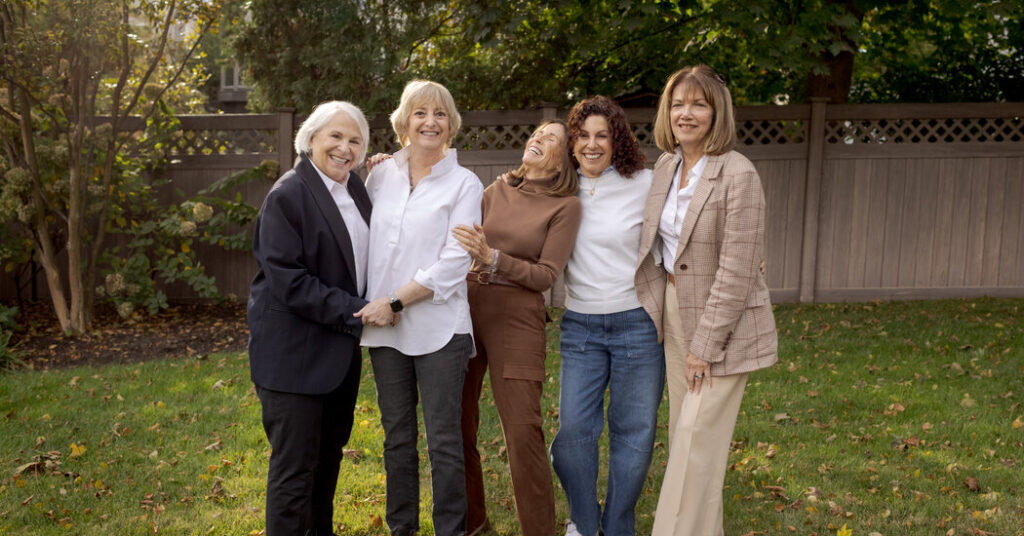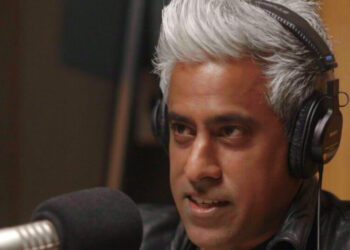The members of this impossible-to-get-into club have logged a combined 330 years of marriage. Among them, they count 15 children, 27 grandchildren (with one on the way), assorted professions and innumerable tears shed, hands held and assurances given that none of life’s difficulties will be faced alone.
In Long Island community centers and therapists’ offices, they have met on approximately 880 occasions and talked, in the strictest confidence, for some 80,000 minutes about pacifiers and timeouts; about feeling overwhelmed by careers and feeling undervalued without them. They have discussed empty nests, dying parents, tensions with adult siblings, marital conflicts, parenting grown children — oh, the worry never stops — retirement, aging, illness and even the death of one of their own.
This is “Group,” a generically named, remarkably devoted circle of friends.
Group is six women, all in their 70s and each married for a half-century. They have been gathering on the second and fourth Tuesday of each month (minus July and August) for 44 years. Over 90 minutes, they share with each other — and a paid facilitator — their worries, struggles and triumphs. It is not, clinically speaking, group therapy. But it is also not a social gathering.
“We are not swapping recipes,” said Miriam Caslow, 74. “This is hard work.”
Dr. Caslow, a retired physician, sat with others members on a recent afternoon to discuss the role that a group like Group can play in women’s lives. They nestled close on an L-shaped couch at the Greenvale, N.Y., home of one member. There was no music playing in the background. There were no snacks on the coffee table. No one was looking at a phone.
Their group did not start as an exercise in women’s consciousness raising, the sort of gatherings that had been in vogue a decade earlier. This was unabashedly a family-raising effort, built on the philosophy that the job of molding confident children and maintaining strong marriages is best done in community — with other women walking the same path.
But what began as an opportunity for young mothers and wives to learn how to best nurture their families became something bigger.
Group was — Group is — a gift they gave themselves.
Decades into an era of social media that has deadened the meaning of the word “friend,” these women present an undiluted example of the value of real-life, in-person, longstanding bonds.
‘No ifs, ands or buts.’
To understand the longevity and intensity of these relationships, rewind to 1981. That year, a counselor named June Azoulay was leading a “Mommy and Me” class for toddlers and their mothers at a local Jewish community center. When it ended, she asked some of the women if they would like to form a new sort of arrangement, meeting twice a month without children to share parenting strategies and concerns.
Group was born.
Within a few years, word of this tight-knit band of women had spread around the North Shore of Long Island. “People were jealous of it, obviously,” Dr. Caslow said. “But we have not accepted a new person in more than 35 years. We can’t. We speak in shorthand.”
“These were women who were asking, ‘How can I have a strong and healthy family without losing myself in those efforts, and how can I not do this in isolation?’” said Dr. Sandra Wolkoff, who served for about 15 years as Group’s facilitator, until 2019.
From the beginning, members made Group a priority. Susan Stein, 74, said her husband knew he had to be home to watch the children every other Tuesday, and the children knew why: Mom has Group.
“It became a ritual,” she said. “There were no ifs, ands or buts.”
The structure of the sessions has not changed over the decades. The facilitator leading Group (there have been three over the years) asks who has an issue to share. Sometimes the conversations revolve around family joy; other times they work through woes. There is always laughter and, often, at least a few tears. Members say they walk out of every session feeling buttressed by emotional support and armed with practical solutions.
“You get five or six other people to look at the problem and a therapist to bring in context and research,” said Joyce Bartolomeo, 78.
The women spent the early years discussing parenting strategies and the demands of marriage.
When little kids and their little problems grew bigger — drinking, teenage rebellion, depression, heartbreak — Group was there.
An advice lexicon developed. “Manage by fact.” (Do not let anxiety overtake decision-making.) “Don’t write the script.” (Do not get ahead of yourself.) And the self-explanatory, “Count to 10 before you answer either your husband or your kids.”
The women had a rhythm for introducing new parenting tactics gleaned from Group on Tuesday nights. This involved trying to avoid letting their children know that the advice was group-sourced from Group.
When was the best time to try out something new on their kids? “Never on a Wednesday,” one of the women explained at their recent meeting. (It is hard to say who said this, because often their words layer on top of each other, and even if you are sitting in the room with them, it can be hard to know who is saying what.) If you did that, another said, “your child would say, ‘Oh, good, Mom, you spoke to Group.’”
Group was an omnipresent fixture in the lives of their children. Stefani Wiener, whose mother, Judi Marcus, is a member, said her childhood and college friends were aware of it, as are her adult friends. “Group is like Madonna,” said Ms. Wiener, 42. “Everyone knows about it, and it doesn’t need a last name.”
‘They are like my sisters.’
Before Group, some of the women knew each other casually from the neighborhood or car pools. Some were strangers. But that was long ago.
“There is not an aspect of my life they don’t know about,” said Leslie Popkin, 73, one of the members. “There is not an aspect of my life they haven’t helped me through.”
When her daughter, Dori, struggled with an eating disorder as a teenager and was hospitalized, Ms. Popkin turned to Group for support.
When the women bring up an issue, she said, the routine response is, “How can Group help you with this?” She remembers clearly what she asked for.
“You can remind me that I am not a bad mother,” she said she told them. “You can remind me that you are always here for me. You can remind me that Dori is going to get better and come through this.”
Ms. Popkin, a literacy coach and retired teacher, described the support she received as a “web of interlocking hands” that encircled her. “Group carried me,” she said.
Now that Dori Chait, 47, is healthy and a mother of teenagers herself, she says she can appreciate how difficult her illness must have been for her mother. “I am really glad she had Group to help her,” she said.
Group has supported Sandie Litman, 76, through breast cancer and the emotional hurdles that accompanied her retirement from her job as a technology specialist for a local school district.
She has not been shy when her feelings have been hurt by the cliques that form. “Just like family it can get messy,” she said. “But we work it out. ”
Then there is Ms. Marcus, 73, who helps manage her family’s photography studio and is quick to place her hand on a friend’s during a moment of vulnerability. Since moving from Long Island to New York City 21 years ago, she suffers though Long Island Expressway traffic two Tuesdays a month, a sign of her commitment.
“There are other benefits for Judi too,” said Ms. Popkin, “because this lets her go to a whole other T.J. Maxx.”
Ms. Marcus once wanted to quit Group, she said, after a disagreement with Ms. Popkin left her furious and hurt. But the others would not let her go. So she and Ms. Popkin worked it out in Group.
“This taught me a lot about forgiveness,” Ms. Marcus said, “and about not giving up on something that matters to me.”
Ms. Stein was a stay-at-home mother when Group began but now works as a real estate broker. She clings to the lessons learned in their bimonthly sessions. “Don’t pick up the pot” is her favorite. (When a conversation within a family gets heated, take a pause until emotions have calmed.)
Ms. Bartolomeo is the sole Republican. “I stick out like a sore thumb,” she said. Since she and her husband now live in Florida half the year, Ms. Bartolomeo, a retired nurse practitioner, often joins Group from her computer and can feel less emotionally connected as a result.
The dynamic has not been the same for her since her best friend and fellow Group member, Erika Bruno, died from cancer in 2021. But still. “They are like my sisters,” Ms. Bartolomeo said. “I tell them everything.”
The membership of Group shifted a bit in its early years — a few women dropped out, a few others joined. A dozen years into Group, one member moved to Paris.
The women understand that Group’s longevity relies on the maintenance of their relationships. It’s not always easy. Some women and their husbands socialize outside of Group with other members, which not everyone approves of. When their adult children host parties and invite some members of Group but not all, feelings get hurt. The women then come together on a Tuesday to hash it out.
As a group, though, the women love taking their friendship outside the therapist’s office. For Group’s 25th anniversary, they went to Las Vegas with their husbands. In 1995, Group traveled to Paris (to visit their expatriated member; the commemorative T-shirt says, “Le Group”) and in 2001, to Rome (T-shirt: “Il Gruppo”).
When each of their children had their first child, Group pooled money to buy a gift, usually a stroller.
When their children were getting married, Group wrote to the brides, to share wisdom. “Routines are great for kids,” Group advised, but “romantic interludes … any time, any place.” And, if your husband’s “chewing, eating habits or breathing begin to grate on your nerves,” they lamented, “join the club.”
Not easy to replicate
Today, the women still discuss their children — the difficulties of knowing that their perspective might be valuable but not always welcome, and the feelings of being disconnected at times, particularly from adult sons who are busy with their own marriages, children and careers.
“They have their own nuclear family,” said someone — this was one of the moments when they all talked at the same time, their voices melding into one. “And so I remind myself, ‘So what if he doesn’t call for a few weeks?’”
“She still doesn’t believe that,” another woman chimed in, to universal laughter.
“I bought him a mug that says, ‘Don’t forget to call your mother,’” one said.
“At least his wife calls me,” another added.
Michael Litman, Sandie’s husband, says his wife has many friends and close relatives, but Group’s support is singular. “To watch them go from one chapter of their lives together to the next and next,” he said, “well, it’s very beautiful, and I’m not sure it can be easily replicated.”
Jamie Cooper, Joyce Bartolomeo’s daughter, recalled feeling overwhelmed after having a child of her own. Her mother’s advice to her was born of experience. “She reminded me that being a mom, a wife, a daughter and a professional were not meant to be done alone, and once I found ‘my people’ like Group it would be entirely different,” Ms. Cooper said.
Like other daughters of Group, she has tried, with only limited success, to recreate her mother’s dynamic. The daughters now realize how unique their mothers’ commitment has been.
Sasha Bruno, Erika’s daughter, said she always felt proud of her mother’s involvement in Group but never understood the power of the bonds until the summer of 2020.
That was when she pulled up to her parents’ home in Bayville — during some of the most isolating days of the Covid-19 pandemic, and also about a year after her mother had been diagnosed with brain cancer — and saw six women on the lawn.
It was Group. They were hoisting signs painted with hearts as they yelled, “We love you!” to her mother, who sat in a wheelchair on the porch.
Erika died about six months later.
Sasha now cares for her father as she raises her young son. For the past year, to help her cope with her grief and look to her future, she has found support and solace every Wednesday night, when she meets with half a dozen others, and a therapist, to talk and to listen.
“I guess,” Sasha said, “that I am carrying on my mother’s tradition.”
Audio produced by Tally Abecassis.
Katherine Rosman covers newsmakers, power players and individuals making an imprint on New York City.
The post The Key to Their 50-Year Marriages and Close-Knit Families? Friendship. appeared first on New York Times.




